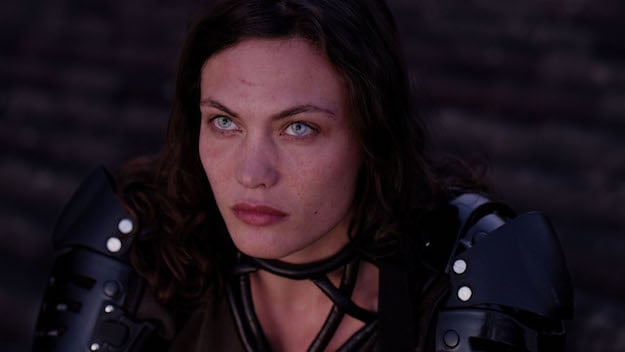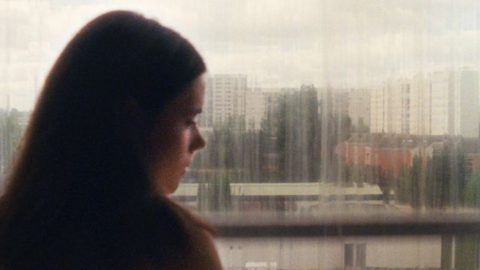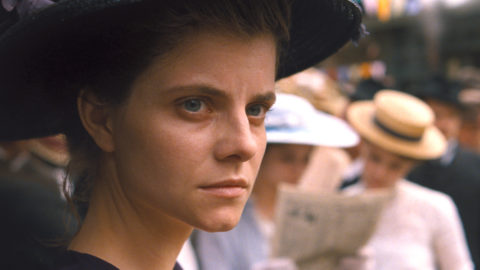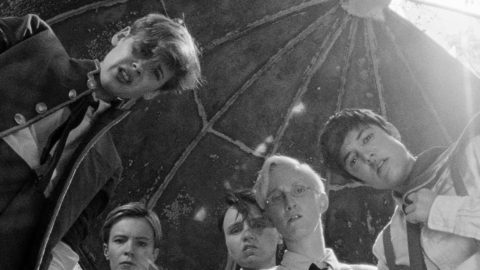Film of the Week: Jessica Forever
Jessica Forever screens Friday, February 8 at Film Society of Lincoln Center as part of Film Comment Selects.

A favorite critical term of mine—one I know I use far too much, but it’s just so damn useful—is OVNI, as used by French reviewers. It means “UFO,” and absolutely fits the bill for those films that seem to come out of nowhere, that bespeak a wildly nonconformist sensibility, and that you can’t believe ever got made. But what about those films that, “ovnicity” apart, seem perfectly open to classification and description—and yet that you don’t really know quite what to do with?
A new French film, Jessica Forever—screening on February 8 in Film Comment Selects, then in the Berlin Film Festival’s Panorama section—is a good example. I wouldn’t have any trouble describing it to you—in fact, I’m about to do just that—and I have a reasonable sense of what it is and what kind of sensibility it springs from. But I’m really not quite sure how to respond to it, how to use it, as it were: rather than a UFO, it’s more like an alien artifact of unfathomable purpose. It’s something like those enigmatic implements left behind on earth by extraterrestrial visitors in the Strugatsky Brothers’ science-fiction novel Roadside Picnic (the inspiration for Tarkovsky’s Stalker); or perhaps, like those perplexing creations—sculptural, filmic, or other—that you often find in modern art exhibitions. And in spirit, that’s the world that Jessica Forever seems closer to, as opposed to narrative film in any conventional sense.
The film does have a story to tell, though, and a genre that it belongs to, more or less. The first feature by Caroline Poggi and Jonathan Vinel, Jessica Forever could be described as a future-dystopian science fiction drama—at least, insofar as you might find the term “future-dystopian science fiction drama” listed under the rubric “mixed media” on a wall label in a gallery. It’s set in a future or parallel France, or somewhere, at a time when—a female voiceover tells us at the start—“many orphans populate the earth.” Jessica (Aomi Muyock, from Gaspar Noé’s Love) is Jessica, an errant warrior woman, first seen in black combat armor resembling a ninja Joan of Arc, who travels around rescuing endangered orphan boys. The situation she’s dealing with is made apparent in a sit-bolt-upright opening scene: in a blandly quiet, clean, seemingly unpopulated suburb, a young man runs towards a detached house and hurls himself through a plate glass window. Jessica rescues the bloodied lad and welcomes him into her “family” of orphans—a group of young men, from adolescence into at least their twenties, accoutered like her in black warrior garb. Jessica, we learn, is rescuing the boys from themselves—from their uncontrollable, sometimes self-directed violence—but she’s also keeping them out of range of the authorities, whose emissaries are a roving squadron of armed killer drones. Those drones in full force are something to behold, especially if you’ve become jaded about the power of CGI: a shot of them approaching from the horizon, like a swarm of prehistoric mosquitoes, is one of the most surprising and downright unnerving spectacles recent cinema has provided.
There’s also an extraordinary moment when, under fire from the orphans’ massed Kalashnikovs, the drones explode in mid-air, in slow-motion—like the ending of Zabriskie Point reimagined for the Xbox generation. But Jessica Forever isn’t primarily about effects or action—it’s largely about feelings, and surprisingly delicate feelings at that. Jessica is a surrogate mother to her group of boys—a calmly devoted figure of compassion inspiring quasi-filial devotion from these males who are at once embodiments of testosteronal fury and at the same time gentle cubs. Her nine- or 10-strong group—variously named Trésor (Treasure), Magic, Dmitri, or Léopard—just want some tenderness and a home to call their own, and what Jessica supplies is shelter, unconditional love, and a sense of order. She’s big on two things, a new recruit is told: training, and the communal afternoon nap session, where the boys snuggle down on mattresses like primary schoolers after lunch (it’s good for bonding). When they move to a house where they all get rooms of their own, one orphan, Raiden—played by the best-known cast name, boxer-faced art-house regular Paul Hamy (The Ornithologist)—ruefully asks Jessica whether they’ll still get to share siestas.
After a heavy drone assault, the family set out in search of a new home. Two boys form an advance guard to an unnamed island; one, gazing at a magnificent postcard sunset, frets, “Can we get our favorite cereal here?” Sure enough, they find a dream house, but they also find an unfamiliar civilization: a few shots of a shopping mall have a wonderfully unsettling effect, as these are the only recognizable signs of a familiar world treated more or less naturalistically, and therefore feel thoroughly other.
It’s on the island that other female presences enter the boys’ enclosed world—I’d say to disruptive effect, except that the disruptiveness comes entirely from the boys themselves, from their wild impulses or from their past. One boy, shy Michael (the poignantly beaming Sebastian Urzendowsky) falls for a fearless local girl, Camille (Maya Coline), while another, Lucas (Augustin Raguenet) receives unearthly visitations from his dead sister, who magically materializes in a vibrant red T-shirt—and calmly joins him for a racing game on the PlayStation.
Despite the title, Jessica is not the film’s central figure. She’s more like the boys’ guiding spirit, the flag they march under: “Jessica Forever” could be their motto. The film is more involved with the contrasts of modern young masculinity: brutal on one level, soft on another, desperately vulnerable. The boys live by a fearsome warrior code—“Never ask questions—Be stupid—Be a monster—Do it clean—Be bloody and be happy.” But they’re also serious about doing housework: one sequence, in which the troop carefully tidies their home, calls to mind the legionnaires meticulously ironing their shirts in Claire Denis’s Beau Travail.
One minute the boys play gently with kittens, the next take on all comers in a Hulk-like rage. But apart from Michael, who proves susceptible to Camille—although it takes some trying on her part—the squad seems effectively asexual. Even when they’re all showering naked with Jessica, it couldn’t be more chaste. The boys—who seem to range from mid-adolescence to their thirties—are really children, with Jessica as mediator between them and the forbidding adult world, represented by those punitive drones. One of the film’s (possibly satirical) preoccupations is the way that childhood and consumerism are inextricable in our culture: at one point, Jessica comes back from a shopping trip to regale her charges with presents, which range from clothes to a table full of junk food to a motorbike, tenderly propped up on a boy’s bed.
Jessica Forever is one of those films that might be described as conceptual in that so many sequences seem to focus on one very strong visual idea, like the sequence in which the boys perform a series of stomping dance moves to a Mogwai-like piece of guitar rock, booming on huge outdoor speakers. The film is steeped in rock culture of a somewhat fetishistic sort, its imagery existing at a nexus of video games and heavy metal—as witness the glimmering neo-Gothic chrome lettering of the titles.
Shot (by Marine Atlan) and edited (Vincent Tricon) with a bright, ruthless cleanness, the film feels at moments like an exercise in pure style—except for its coherence, its invention, and its tenderness (albeit a tenderness of an oddly detached, even cold sort). This feels very much, in fact, like a piece of conceptual art: the sort that combines seemingly incongruous elements, or matching elements combined in an incongruous register, and leaves you to work out how, or if, to respond. You suspect that the film-makers haven’t been untouched by the influence of Matthew Barney (who has made his own outré use of heavy-metal imagery). Distinct elements of kitsch, even preciousness, offset the martial toughness: oddball effects such as a little talking globe of water; a tree glowing eerily against the night sky; and an utterly shameless WTF moment that’s practically Japanese in its kawaii cuteness, involving the pink lettering on a birthday cake.
As for the dramatis personae, the film cheerfully flouts the rules of character: there are no spuriously motivating or “humanizing” back stories—the warrior boys are figures in a landscape, some emerging in different ways, and in their own moment, into the daylight, but often in an effect of gesture, or physical being. Jessica herself is a principle, rather than a personality: even if you’re allergic to the overuse of the word (and you should be), it’s fair to say that she’s an icon. She’s a mystery, almost in the religious sense: no self, no interiority, just a profoundly strong manifestation. Viewers expecting that screen amazons and warrior females should be seen to kick ass will be disappointed: Jessica hovers above the action, at a distance from it, but the sight of her in battle armor at the start sets the tone for the whole thing: she is, in every sense, a tough mother. Aomi Muyock, who barely speaks throughout, may not be—at least, not on the strength of Love—a great actor, but she’s a phenomenal presence. Nature—or color grading, or both—has given her blazing blue eyes, and her skin is rough, slightly scratched, as if she’s seen some combat. She has a square, somewhat Slavic face, a compassionate muscularity that suggests Simone Signoret crossed with the Michelle Rodriguez school of modern tough girl.
Poggi and Vinel—co-writing with Mariette Désert, a script collaborator of Mikhaël Hers, Katell Quillévéré, and Virgil Vernier—made their name with shorts including After School Knife Fight (2017). They are among a group of French filmmakers who pursue their own anti-realist, gender-fluid, kitsch- or camp-inflected aesthetic, shot through with a cool irony that harks back to ’80s-style postmodernist chic. They teamed up with Bertrand Mandico (Wild Boys) and Yann Gonzalez (Knife + Heart) for a shorts package called Ultra Rêve (“Ultra Dream”), and published a manifesto in Cahiers du Cinéma, which called for “a cinema in flames. A cinema for sweating dreamers, weeping monsters and burning children… we invite all burning hearts to come and blow on the embers.” Well, you can’t have enough artistic manifestos, the more fervently ablaze the better. The fire is palpable in Jessica Forever, the flip side of a sometimes glacial cool that makes this film a perplexing alien object, and a phenomenally seductive one.
Jessica Forever screens February 8 in Film Comment Selects at the Film Society of Lincoln Center.
Jonathan Romney is a contributing editor to Film Comment and writes its Film of the Week column. He is a member of the London Film Critics Circle.







